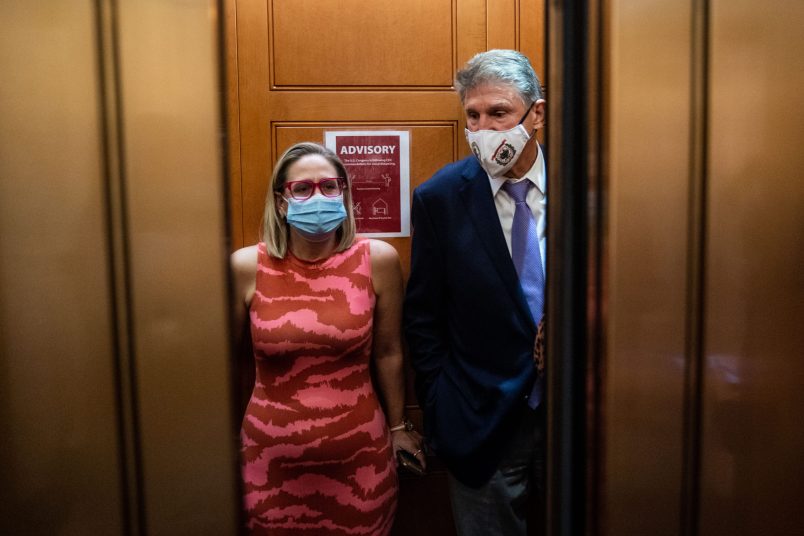Senate Republicans blocked a major piece of Democrats’ voting rights legislation, keeping the bill from even advancing to a floor debate despite Sen. Joe Manchin’s (D-WV) insistence that it could garner bipartisan support.
Stop me if you’ve heard this one before.
To most in the caucus, the latest bill being wordlessly blocked points at an obvious next move: addressing the filibuster, the Senate rule that requires a supermajority for most pieces of legislation.
“There are two possible next steps,” Sen. Angus King (I-ME) told reporters as he munched a protein bar after the vote. “One is negotiations, for the Republicans to say ‘okay, here’s what we’ll go along with, here’s what we need, here’s what we want.’ The other is to modify the rules in such a way that we can pass the bill because democracy is at stake.”
The first avenue, Manchin’s preferred route, has proven fruitless. He and the bill’s other cosponsors carried out weeks of conversations with Republicans, only to see zero of them help Democrats break the filibuster.
“So far, all they’ve done is say no,” King said.
That leaves the second route: reforming the filibuster.
Sen. Tim Kaine (D-VA) said that the caucus is kicking around a few different proposals: a carveout to make voting-related bills exempt from the filibuster, a resurrection of the talking filibuster, maybe a version of the talking filibuster where the minority has to continually provide 40 votes to keep the blockade going.
“Senator Schumer has been pretty clear about it, he recently said we gotta do something before Thanksgiving,” Kaine said, pointing to redistricting reforms in the bill as one particular aspect on which Democrats can’t delay. If they wait too long, he worried, the reforms won’t be in place before the 2022 midterms.
That sense of urgency, he told TPM, has been growing within the caucus, and will only intensify after the failed vote.
“We can’t not do it,” he said. “We have to do it.”
Senate Majority Leader Chuck Schumer (D-NY) struck a similar tone, putting the situation in historic terms as he addressed the chamber just after the vote. He compared the current moment to the aftermath of the Civil War, when the majority in both chambers passed civil rights legislation over the will of the minority.
“To the patriots after the Civil War, this wasn’t partisan — it was patriotic, and American democracy is better off today because the patriots in this chamber at that time were undeterred by minority obstruction,” he said.
“Members of this body now face a choice — they can follow in the footsteps of our patriotic predecessors in this chamber,” he continued. “Or they can sit by as the fabric of our democracy unravels before our very eyes.”
Sens. Joe Manchin (D-WV) and Kyrsten Sinema (D-AZ) are the “members of this body” Schumer is trying not so subtly to goad to action. Both have expressed discomfort, at times refusal, to consider abolishing or reforming the filibuster.
They continue to be the final boss in the video game that’s ultimate goal is to pass legislation through regular order. Democrats have done all the side plots, and are in the process of passing everything they can through reconciliation. But at a time coming soon, the only way forward will be through the filibuster — and whether that path will be navigable entirely depends on the whims of those two senators.
Sen. Brian Schatz (D-HI) summed up the viewpoint of the 48 Democratic senators not named Manchin or Sinema, when asked by TPM Wednesday what happens next in the voting rights effort.
“I don’t know the answer to that,” he said.



